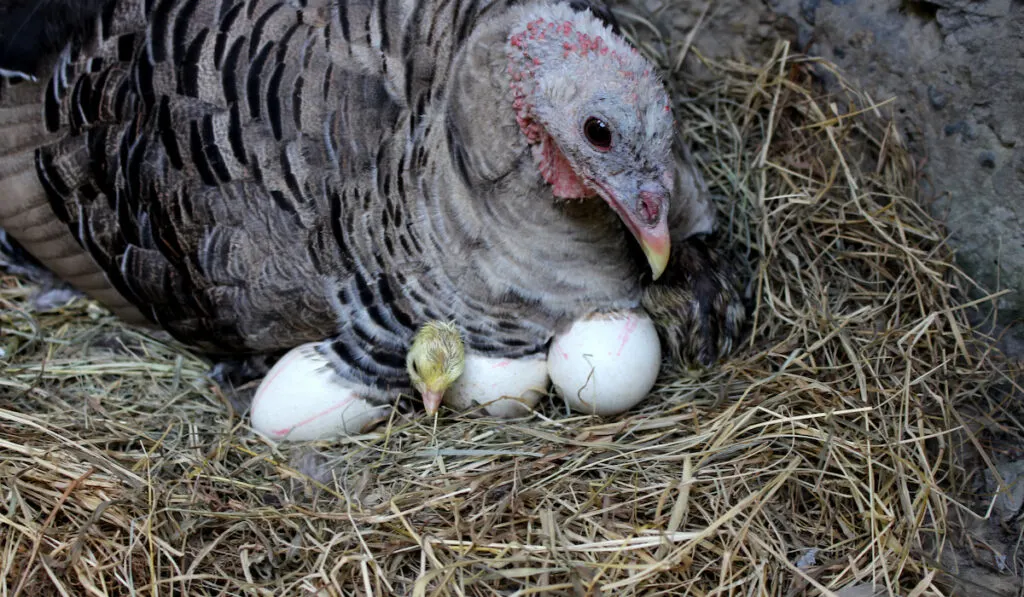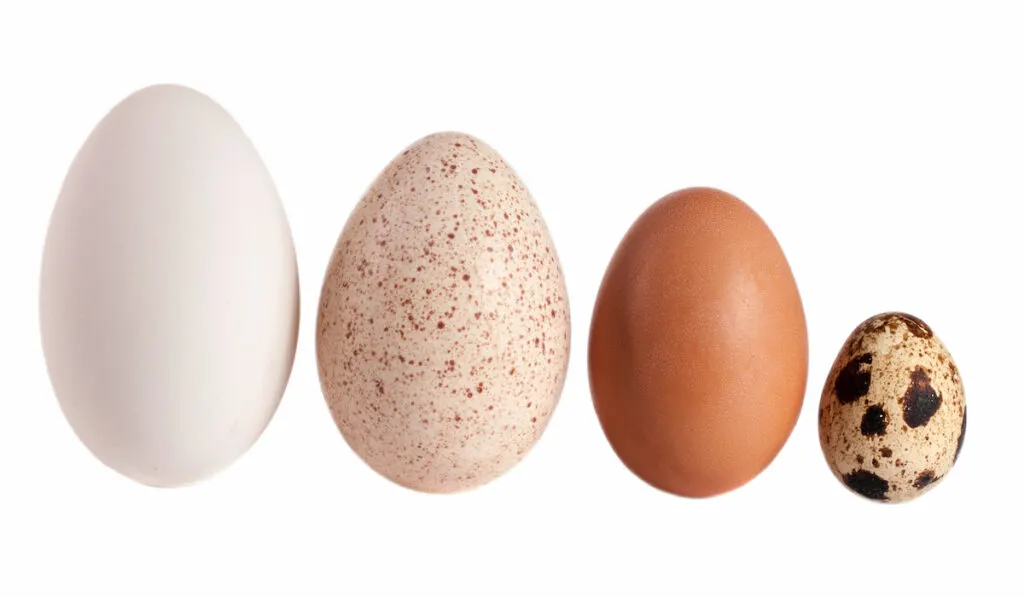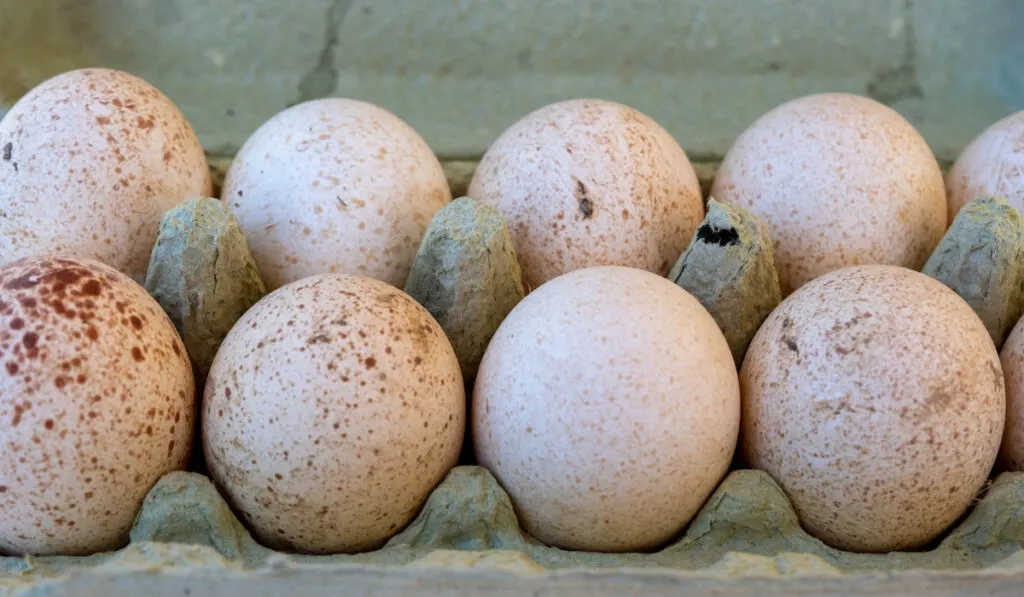Have you ever wondered why we don’t eat turkey eggs? Turkey seems like it’s everywhere.
We have ground turkey, turkey slices, and famous turkey legs at amusement parks. Grocery aisles in every grocery store in America have tons of different turnkey options. You can buy some slices of smoked turkey, baked turkey, honey turkey, etc.
With so much turkey, what about turkey eggs?
Turkeys are larger than chickens, so won’t start laying eggs as quickly as their cousins. When do turkeys start laying eggs? Well, they usually start to lay at around 7 months.
They have a longer life cycle, so their reproductive systems kick in a bit later. Chickens, on the other hand, will start laying eggs at around 5 months.

People who raise turkeys say that turkey eggs are delicious and pretty much taste the same as chicken eggs. So, why don’t we eat them? The answer is almost all about cost. Turkeys are larger, so they cost more to raise and feed.
It doesn’t make economic sense for farmers to raise turkeys for their eggs because not many people would pay the extra cost to get something so similar to more affordable chicken eggs.
Still, if you’re interested in turkey eggs, we’ve put together a fun list of 11 facts about turkey eggs you should know!
Table of Contents
Turkeys Don’t Lay Many Eggs
Egg-laying chickens are almost like clockwork. Every morning, you can go out to the coop to harvest eggs in the same spot from the same birds. They get into a rhythm and keep them coming. It’s amazing how reliably chickens lay eggs.
Turkeys, on the other hand, only lay about two eggs per week. Those are usually farm-raised turkeys.
It’s fine to grab and eat the turkey eggs when they do lay them, but you’re not going to see many turkey egg farms popping up with that kind of production.

You Can Buy Them in Some Places
Just because they are hard to find doesn’t mean turkey eggs are impossible to find.
Sure, you’ll have to do a bit more looking than if you’re shopping for chicken eggs or even duck eggs, but they’re out there. You can expect to pay around $3 for every turkey egg you buy. You can see why that quickly becomes unsustainable as a business.
Turkey Eggs Are More Valuable Fertilized
When you understand how much you’ll pay to buy a turkey egg for that omelet you want to make, you realize it doesn’t make sense for turkey farmers to raise turkeys for their eggs. Not too many people are going to buy turkey eggs for $3 every day.
Fertilized eggs are way more valuable because they can transform into turkeys harvested for meat.
Some Turkey Hens Only Lay Eggs Once a Year
Some turkey hens can lay up to 100 eggs every year, but the conditions have to be right. Hens usually lay eggs in clutches in the spring in nests that they spend time preparing.
They have strong instincts to make concealed nests on the ground to give their eggs the best chance of surviving against predators that love a good egg.
Hens Wait for a Good Number of Eggs Before they Start to Roost
Hens will start laying a couple of eggs a week but won’t roost until there is a decent number of eggs in the nest.
Typically, a turkey hen will want to see around 10 eggs in the nest before they settle in and start incubating the eggs. When they do hatch, though, it’s a ton of fun to see so many turkey chicks in one place.
Roosting Time Is Longer than with Chickens
Turkeys have to sit on their eggs for longer than chickens to get their eggs to hatch.
The typical roosting time for a turkey hen is around 28 days before you’ll start to see eggs cracking and baby turkeys popping out.
Turkey Eggs Are Big!
Turkey eggs are larger than chicken eggs, as you might suspect. They’ll be anywhere from 30% bigger to 50% larger than the size of a chicken egg.
When you line them up against other bird eggs like geese, ducks, pheasants, and quails, turkey eggs are the biggest by far.
Obviously, the size of the turkey the egg comes from will dictate how large the eggs are. The same goes for chickens and every other type of bird. Larger birds lay big eggs.

Turkey Egg Shells Are Thick
For people who get their hands on a turkey egg and finally crack it open for breakfast, they are surprised at just how thick turkey eggs are.
It’s much thicker than a chicken egg, and it takes some muscle to get them open. You might have to give them more than a couple of whacks on the pan or even crack them open with a knife before you can start cooking them.
Turkey Eggs Are Yummy!
Turkey eggs taste great. Some people even prefer eating turkey eggs. They like them because they’re bigger and can have a heartier flavor than a chicken egg. The taste differences are subtle, though, so if you enjoy eating chicken eggs, you’ll love turkey eggs.
If you’ve ever eaten duck eggs, you’re moving in that general direction. The difference between turkey eggs and chicken eggs isn’t that stark. Turkey eggs are slightly stronger and can be creamier than chicken eggs.

Turkey Eggs are Healthy
A typical turkey egg will give you around 130 calories and a good deal of healthy fats. They are high in cholesterol, potassium, and protein.
In fact, the nutritional facts with turkey eggs are pretty much the same as chicken eggs. You get more of the egg with turkey eggs, so you can adjust numbers up due to the increased size.
They Come in a Variety of Colors
As modern humans, we don’t usually get the full experience when it comes to buying produce. Everything we see in the store has gone through stages of processing before it gets to the shelves.
Eggs aren’t naturally white, for example. Most of the time, eggs have brown or are shades of brown. Producers wash them and bleach them to make them look nice and shiny for shoppers.
The same goes for turkey eggs. Because they’re not on grocery shelves, most of the time you’ll buy turkey eggs from farmers who aren’t going to go to all that trouble.
As a result, you’ll see turkey eggs that are peach-colored, brown, creamy white, or with small brown flecks on them.

Final Thoughts
If you’ve ever wondered what a turkey egg tastes like, you should give them a try!
They are delicious and healthy for you and worth the experience. It’s probably not something you will be eating every day, but at least you can say that you have tried a turkey egg.
Hopefully, this list helps you understand a bit more about why we don’t see turkey eggs on grocery store shelves.
Still, they are perfectly fine to eat and a great source of protein. It just might take you a bit of extra work to find out where they are and how to get them.
